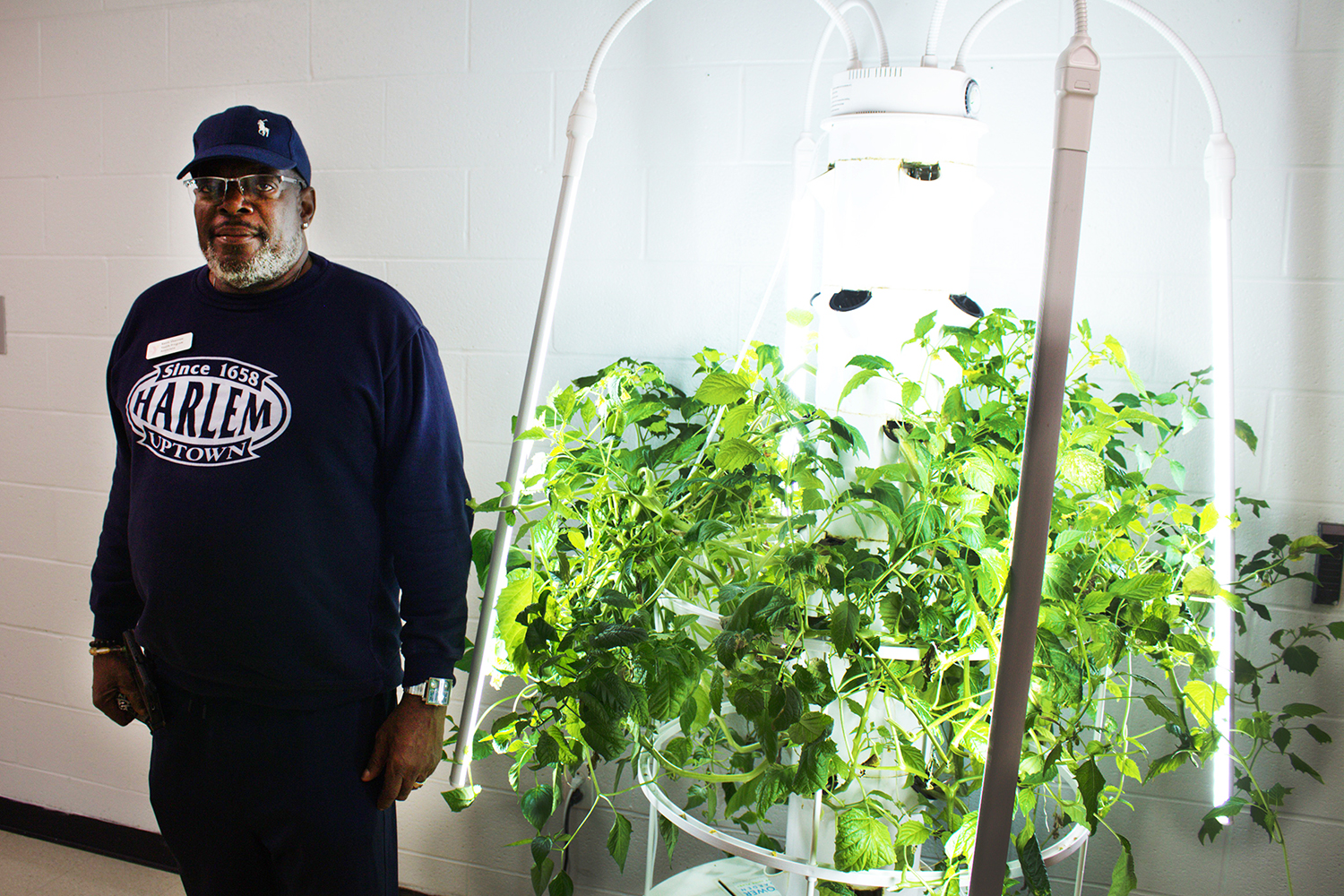Two teams of students, one from UConn and one from Fort Hays State University, pitched their sustainability-focused start-up business plans to address food waste in the second Werth Innovation for Sustainability Challenge held on Nov. 2 at UConn.
FHSU alum and event sponsor Peter Werth attended to watch each team’s 10-minute pitch, as well as UConn CLAS Dean Ofer Harel. The pitches were judged by Amelia Martin ‘23 ‘25 (CAHNR) and CEO of Mud Rat and David Kligman from Grow Hays based on metrics including their presentations, business plans, and the ease at which they could deploy their ideas.
UConn’s team included Judith Otunnu ’27 (CLAS), Andy Zhang ’26 (CAHNR and CLAS), Lisel Nee ’26 (ENG), and Nathan Bannish ’24 (CAHNR), and was project managed by Department of Geography, Sustainability, Community and Urban Studies Ph.D. student Thomas Bonitz ’24 (CLAS). Department of Geography, Sustainability, Community and Urban Studies Professor Carol Atkinson-Palombo served as the team’s faculty mentor. Atkinson-Palombo is also a core faculty member for UConn’s Collaboratory for JUST Innovation and Climate Equity or JUSTICE Collaboratory.
“The JUSTICE Collaboratory has a mission of integrating teaching and research that is applicable to real-world solutions to the climate crisis,” says Atkinson-Palombo. “Real-world projects like these are essential to making the concepts that are introduced in classroom settings come to life. This is a perfect example of the type of applied learning that JUSTICE will be promoting. In addition, the interdisciplinary nature of the team members has given students an opportunity to appreciate, firsthand, the critical importance of bringing together collaborators with diverse skillsets to create projects that are well-rounded and grounded in equity.”
Both teams voted on this year’s theme, which was focused on composting. The UConn team pitched an idea to implement an on-campus composting solution to facilitate closing the loop for campus food waste. The idea came together over six weeks and Bonitz reflected that the experience has been a lot of work but also a great learning experience:
“It’s been a lot of fun, and the team has been great to work with. We came at this with a variety of backgrounds which allowed us to develop a holistic proposal for what composting on-campus could unlock for UConn. We really believe in our project, and we’re excited to pursue its implementation,” said Bonitz.
The team worked closely with campus community members, including the Executive Director of UConn Dining Services Michael White, to assess their ideas and learn about current composting efforts by UConn which happen off-campus at Quantum Biopower.
“Coming into this program, we had little to no knowledge about UConn’s current food waste system. With the help of Mike White, along with Marc Morgan and Abbie Webb from Casella Waste, we were able to build a comprehensive understanding of UConn’s food waste needs. This collaborative effort has enabled us to not only identify key challenges but also explore innovative solutions tailored to UConn’s unique campus environment,” said Zhang.
The students researched and compared different on-campus composting options and operations at other universities to see what a good fit for UConn could be. Where some universities have centralized dining halls, one challenge at UConn is the dining halls are spread out across campus, which added a little complexity to the planning efforts.
“We looked at two composters, they’re both from Green Mountain Technology, and they’d both be located at Horsebarn Hill. We have different options because we want to make sure we’d have a feasible option to handle the amount of waste generated on campus,” said Nee, lead engineer.
Another important consideration for composting operations is what happens to the finished product. The team researched the logistics, such as potential local destinations for finished compost, including campus landscaping applications, Spring Valley Student Farm, and the creation of a campus community garden.
“I looked at community gardens as a solution and one with easy access to campus. The long-term goal would be to make a green space where students can hang out and maybe we can have events to promote sustainability. We also looked at the feasibility of donating or selling compost to local gardens or farmers, maybe the greenhouses could use it. The compost itself could also be a teaching opportunity, where chemistry or biology classes could analyze the finished product,” said Bannish.
As sustainable options and solutions are deployed, a vital element of their success is sharing information with community members, so people are aware of the measures and why they matter. The team considered ways to educate the campus community not just about the importance of composting but also how important it is to reduce food waste overall. Different avenues they explored for sharing this information included partnering with other campus efforts like HuskyTHON and EcoMadness competitions.
“I explored different ways we could implement compost education into the curriculum on campus. We wanted to implement different aspects of the project into each educational level for the campus community, including residential halls and dining initiatives,” said Otunnu.
While the event was a competition, the atmosphere remained friendly, reflecting that collaboration is essential for building a sustainable future.
As the winners of the inaugural Werth Innovation for Sustainability Challenge last year at Fort Hays State University in Kansas, the FHSU team presented their pitch about developing a company that focuses on food waste from grocery stores.
UConn presented their pitch second.
“I think I speak for everyone when I say the pitch went fantastic. We were prepared for every question and each of us got the chance to show that we knew our stuff and believed in our ideas. It was really fulfilling to show off our knowledge and preparedness,” said Bonitz.
The judges were impressed by both teams and had high praise for the quality of work accomplished over the course of just eight weeks. They perceived the plans as actionable, which they hoped the teams would continue pursuing. After difficult deliberation, they determined that the winning team was the FHSU team.
“The pitching process was a novel experience. Coming from an economics and environmental science background, I didn’t really know what to expect in a case competition, but it allowed me to gain practical experience presenting solutions under pressure, adapting ideas based on feedback, and working collaboratively to refine our strategy. It was a refreshing break from the usual class work, so I’m extremely appreciative of having been able to take part in this opportunity,” said Zhang.
“I’m so grateful to have had this experience. This competition gave us the chance to get to know each other, collaborate, and come up with something that could make our university better. I can’t wait to see if we can make our vision a reality,” said Bonitz.
Atkinson-Palombo added, “We have had so much fun pulling this all together. We really appreciate the students putting in all of this extra effort outside of the classroom.”
The Werth Innovation for Sustainability Challenge is made possible thanks to funding from the Werth Institute for Entrepreneurship and Innovation.



